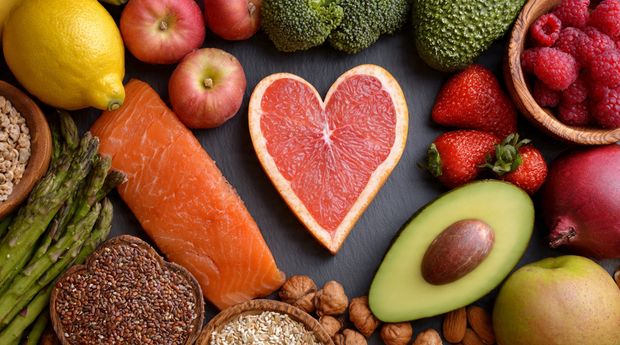“My diet starts on Monday.”
“I can’t eat that — I’m dieting.”
“I’m on a new diet.”
How many times have you said one of these phrases (or heard someone else say them)? Diet talk is common — and with many people trying to lose the weight they put on during the pandemic (an estimated 48% of American adults gained weight in the first year alone), you might be hearing about dieting more than ever.
While paying attention to your diet is important, paying attention to which type of diet you adopt is critical. With so much information about a seemingly endless amount of possible diets — many of which conflict with one another — you may be wondering if everything you’ve ever heard about dieting is actually correct.
Here’s the truth about 6 common statements you may have heard about diets.
1. “Diets are about losing weight.”
Sometimes, weight loss is the main goal of dieting. However, there can be a whole host of other goals, such as maintaining your current weight or gaining weight if you’re underweight. There are also reasons that have nothing to do with weight, like improving your heart health or cutting down on your sugar intake if you’re prediabetic or diabetic.
2. “I’m going on the [insert name of fad diet here]”
Fad diets are short-term, “trendy” diets that promise quick and dramatic results, like losing 2 pounds a week. They often involve cutting out entire food groups or restricting yourself to only one or two things.
Fad diets might seem too good to be true — and that’s because they are. Weight loss is usually temporary and the diets aren’t sustainable. Most dieters end up regaining the weight they lost or even gaining more weight in the long run. One reason these diets fail is because it’s difficult to keep up a fad diet over a long period of time.

Instead of going on a specific diet, focus on making changes to your diet that you can keep up over time — and that are not so restrictive that you can’t stick with them.
Also read, “Small Changes for Healthy Eating”
3. “I’m cutting out carbs.”
It’s all about choosing the right carbs. Carbs can be either simple or complex:
Simple carbs are found in processed and highly sugary foods, like candy or soda.
Complex carbs are found in foods like starchy vegetables, legumes, and whole-grain products. In general, most of your carbohydrate intake should be complex ones.
However, that doesn’t mean you need to cut out all simple carbs. Simple carbs can also be found naturally in fruits, vegetables, and milk products, and they are full of essential vitamins, minerals, and fiber. By the same token, some complex carbs, like those found in white flour or rice, have been processed and don’t contain nutrients.
Instead of fully cutting out carbs, work on limiting simple carbs, highly processed and refined sugars, and try eating more unrefined complex carbs like fruits and vegetables.
Contact your primary care physician to see if you could benefit from nutritional services.
4. “I’m going gluten-free so I can lose weight.”
Gluten is a protein in wheat, rye, and barley. A gluten-free diet cuts out any products containing these ingredients, like bread, pasta, and cereal. This is the main treatment for celiac disease — an immune disease in which gluten damages the small intestine.
In recent years, gluten-free diets have become popular among people who do not have celiac disease, as a way to lose weight. However, while cutting down on your gluten intake might help you lose weight, there is no evidence showing that going totally gluten-free leads to weight loss.
In fact, cutting out gluten when you don’t need to can actually backfire. You may miss out on key nutrients, like iron, calcium, and fiber. Or, you may fall into the trap of thinking that anything marketed as “gluten-free” is healthy — and wind up over-eating.
You can still cut back a little — but if your end goal is weight loss, completely avoiding gluten probably isn’t the answer.
5. “Going vegan or vegetarian is a guaranteed way to lose weight.”
This one is rooted in truth. Evidence shows that plant-based diets tend to be associated with lower body weight and can be helpful for weight loss.
That being said, weight loss isn’t guaranteed. There are many foods that are technically vegetarian or vegan, like meatless pizzas on vegan crusts. If your diet consists mostly of these foods, and doesn’t include nutritious ones like vegetables, you’re probably not going to have much luck on the weight loss front.
Also, becoming vegan or vegetarian can mean not getting enough key vitamins and minerals that are often found in animal products. If you decide to go vegan or vegetarian, pay special attention to eat foods that contain iron, protein, calcium, vitamins D and B12, zinc, and omega‑3 fatty acids.
6. “Now that I’m eating healthier, I don’t need to exercise.”
Your diet may play a bigger role in weight loss than exercise, but that doesn’t mean that you can ignore physical activity.
When you exercise, the amount of calories that your body burns off increases. This, in combination with reducing the calories you eat, can help you not just lose weight, but keep it off. Regular physical activity also has other benefits, such as lowering your risk of diseases like heart attack and stroke, and reducing symptoms of depression and anxiety.
If you have a medical condition like heart disease that could impact which types of exercise are safe or not, make sure to talk to your provider when beginning a new exercise program.
And that goes for dieting, too. Whether you’re looking to lose, gain, or maintain weight, your provider can help you come up with an appropriate eating plan that will help you meet your goals in a safe and healthy way.
Health Topics:







